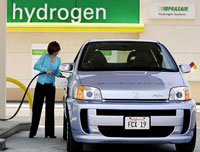Hydrogen fuel may prevent looming energy crisis
It's the most commonly-occurring element in the universe, it can be burned in a combustion engine or used to fuel electric motors, and it's vastly cleaner emissions-wise than gasoline. The automotive industry seems to have settled on hydrogen as the magic bullet solution to the looming energy crisis.

Is hydrogen the answer? Honda is one of many major auto companies that think so -- stating in a recent release on their FCX concept that "Hydrogen will fuel the next generation of global vehicles. It's a fact accepted by the entire industry. And given that it's the most commonly-occurring element in the universe, supply is not an issue."
But what about the new and coming generations of plug-in electric vehicles? As with Hydrogen fuel cell vehicles, its early days yet, but pure electric vehicles seem to have a few strong points of their own. So, with a focus on fuel cells rather than hydrogen fueled internal combustion engines, let's take a look at the set of requirements a transportation fuel source has to meet to be viable, and see how hydrogen and batteries compare:
1. Abundance
It won't be too long before there's a billion passenger cars on Earth, so any future-focused fuel system needs to be able to satisfy an enormous demand. There's plenty of Hydrogen about -- it's the most common element in the universe -- and we're certainly not in any shortage of electrons. Hydrogen storage and battery materials are many and varied, and lithium, the current leader in battery technology, is abundant. The two technologies are relatively even here.
2. Efficiency
Both hydrogen and batteries can be viewed as means for storing and transporting energy for later use. Thus, the ratio of how much energy you get out to what you put in is an important consideration.
Electrolysis of water is the easiest method for producing hydrogen -- but only about 70% of the electric power used in the process gets stored in the hydrogen it creates. Hydrogen then needs to be either compressed or cooled to a liquid in order to store large enough volumes to be useful in a car -- gas compression is the more efficient of the two processes, but still costs a further 10% of the stored energy. The efficiency of the fuel cell storage unit itself is realistically estimated at around 36% under normal driving load -- leading to a dismal overall power-grid-to-wheels efficiency of less than 25%. That is, less than a quarter of the power used to produce the hydrogen is ever actually used to propel the car.
Batteries are a clear winner in the grid-to-wheels efficiency battle. Conventional Lithium-ion batteries charge at about 93% efficiency and operate at about the same efficiency, leading to an overall efficiency of over 85%. For the same energy input, you'll get three times the power out of a battery than out of a fuel cell.
3. Safety
High pressure storage, flammability, toxicity and explosive potential all represent safety hazards. Fuel cells either contain compressed gas at up to 35MPa or liquid hydrogen which needs to be kept under -253 degrees Celsius, so there's clearly the chance for it to cause plenty of mischief in case of an accident. Batteries, however, also have their drawbacks here, introducing the risk of electrical hazards, toxic chemicals, electrical fires and fumes. The jury's still out on this one.
4. Economics
Both fuel cells and high-output battery cells are currently quite expensive, although this is forecast to become less of a factor with the advent of volume production. Of greater concern are the economics of building a delivery network. The current electricity grid system is well established in most countries, and with some modification and reinforcement could be upgraded to handle the strain of fulfilling the shortage of energy left if gasoline is removed from the passenger transport equation.
Hydrogen is more problematic. To derive its main benefit -- the ability to fill a car quickly with fluid energy -- a hydrogen distribution network similar to that used to distribute gasoline would need to be built. Hydrogen atoms are so small that they can sneak out through the molecular structure of many containers and pipes, meaning that it's expensive and problematic to transport in great quantities. Generating the hydrogen on-site at filling stations is a potential solution, but at the end of the day, a fully functioning hydrogen economy capable of replacing the petroleum economy will cost trillions of dollars in America alone. Battery-electrics are a clear winner in this context.
Source: BusinessWeek
Subscribe to Pravda.Ru Telegram channel, Facebook, RSS!


